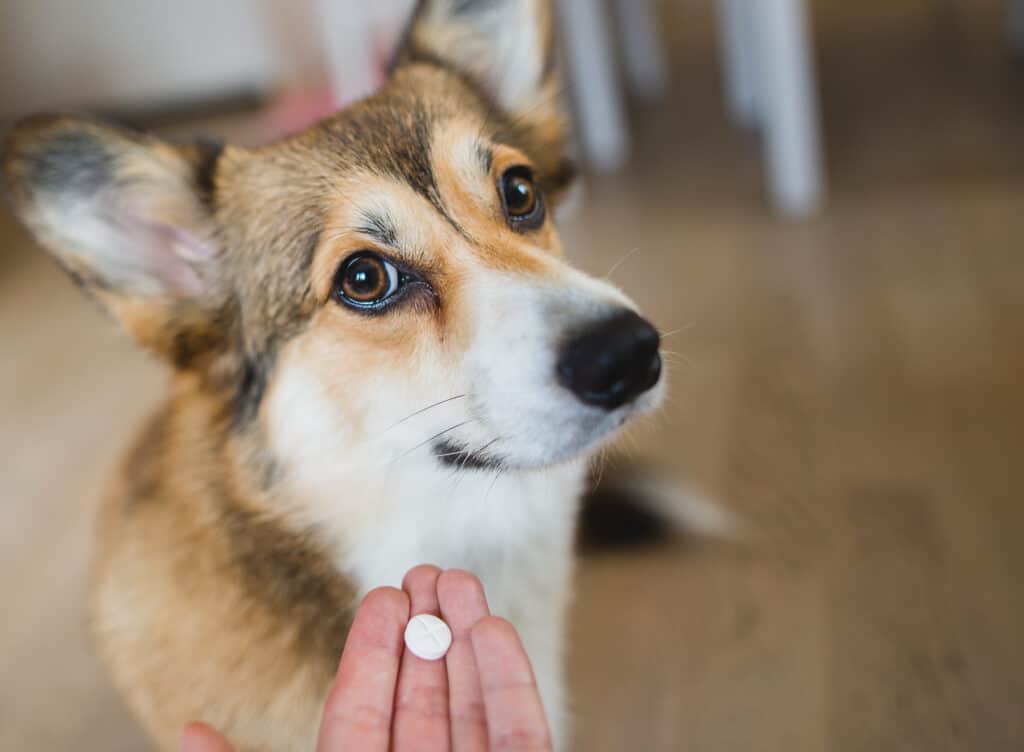If you suffer from painful heartburn, then you might turn to Pepcid in search of relief. Pepcid is a medication that has been used to treat heartburn and stomach ulcers for many years. It is a trusted medication that many of us keep on hand. Many wonder if they can give Pepcid to their canine family members as well.
Pepcid can be used in dogs. But there are a few things you should know before you give this drug to your furry friend. In this article, we will discuss what Pepcid is used for in dogs, dosing, and safety tips!
Let’s get started!
What Is Pepcid?

The active ingredient in Pepcid is famotidine, and it belongs to a class of drugs referred to as H2 blockers.
©Jus_Ol/Shutterstock.com
We should first discuss the drug that is Pepcid. The active ingredient in Pepcid is famotidine, and it belongs to a class of drugs referred to as H2 blockers. Famotidine works by decreasing the amount of stomach acid your stomach creates. This helps to cut back on things like acid reflux or pain from stomach ulcers. Pepcid is found over the counter. But stronger forms of the medication can be prescribed or offered in medical settings.
Can Dogs Take Pepcid Safely?
So, can dogs take this medication safely? It has not yet been approved by the FDA for use in dogs. However, many veterinarians suggest its use for pups that suffer from any type of esophageal or digestive irritation. Some vets offer the pet parent instructions on how to offer this over-the-counter medication. Others will prescribe the form of famotidine that they carry in their clinic.
So yes, dogs can take Pepcid safely as long as it is done under veterinary guidance.
How Can Pepcid Help My Dog?
Let’s discuss the many uses of Pepcid for our canine companions. Famotidine works by decreasing the amount of stomach acid the stomach creates. It is typically used for different forms of digestive complications.
Some of the most common uses for Pepcid in dogs include:
- Acid reflux
- Esophageal irritation from chronic vomiting
- Inflammatory bowel disease
- Megaesophagus
- Esophageal irritation from eating something corrosive (often a toxin)
- Stomach or intestinal ulcers
- Preventative measures for dogs at risk of stomach or intestinal ulcers
- Parvovirus (not treating the virus but managing the GI irritation it causes)
Each of the complications mentioned above can only be diagnosed by a veterinarian. We do not suggest offering Pepcid until you have veterinary approval.
Are There Any Side Effects of Pepcid in Dogs?
You may be wondering if there are any side effects while your pup takes Pepcid. Thankfully, there are only a couple minor side effects to keep an eye out for.
Potential side effects of Pepcid use in dogs include:
- Vomiting
- Diarrhea
- Decreased appetite
- Lethargy
- Dry skin & skin irritation
If you notice any of these side effects, then we always suggest reaching out to your vet for guidance. They can offer you advice on how to manage the side effects safely.
How Much Pepcid Can I Give My Dog?

The standard dose of Pepcid for dogs is anywhere from 0.25mg to 0.5mg per pound of body weight, but this will vary.
©Prystai/Shutterstock.com
We want to be clear: you should only give your dog Pepcid if it has been approved by your vet.
Our dogs metabolize medications differently than you and I do, which is why they will require their own unique dose of Pepcid. The standard dose for dogs is anywhere from 0.25mg to 0.5mg per pound of body weight. But this will vary based on the underlying cause of their digestive irritation.
Pepcid can typically be found over the counter in concentrations of 10mg per pill, but it can be found in 20mg tablets as well. Based on your dog’s body weight, you can break up the pills accordingly.
Can Pepcid Be Dangerous for Some Dogs?
Pepcid is generally safe for most canine friends, but there are situations in which the medication can be harmful. The first potential danger when it comes to Pepcid use in dogs is accidently offering them a medication that contains more than just famotidine.
You will often see medications over the counter that say ‘maximum strength Pepcid’, and this often points to a higher concentration of medication or additional additives. These maximum strength medications can be dangerous if they include other ingredients that are not safe for dogs.
Pepcid can also be dangerous in dogs that have liver or kidney disease, as their bodies may be unable to metabolize the medication properly. Pepcid can also be dangerous for pregnant mothers and their puppies, as well as mothers that are currently nursing their puppies.
The above reasons are an example of why it is so important to speak with your vet before offering your dog Pepcid, as you never know if any of their underlying conditions can increase their risk of adverse effects.
Does Pepcid Interact with Other Medications in Dogs?
Just like with many other medications, there are a few medications that Pepcid can interact poorly with. Some of the medications that interact with Pepcid include:
- Certain cardiac medications
- Some SSRIs
- Immunosuppressants like cyclosporine
- Certain antibiotics
- Anti-fungal medications
While we always suggest getting veterinary approval before giving your pet Pepcid, it is especially crucial if they are currently taking other medications. These drug interactions can cause issues ranging from vomiting to disorientation, many of which will require immediate veterinary care. This is why you should involve your vet team in your decision to offer your dog Pepcid.
Can Dogs Accidentally Overdose on Pepcid?
When giving human medications, many worry about overdosing their furry friend. While this is very rare when following the standard dosing guidance we mentioned above, it can happen if your dog accidentally consumes a large amount of Pepcid.
Pepcid overdose in dogs can occur if they accidentally consume too large of a dose, and this can lead to a few concerning symptoms that require immediate veterinary care. Pepcid overdose in dogs can lead to vomiting, diarrhea, disorientation, restlessness, breathing changes, irregular heart rate, and pale gums. If you think your pup may have consumed more Pepcid than their size requires, we suggest reaching out to your vet immediately.
How Long Can I Give My Dog Pepcid?

Never give a puppy any over-the-counter or human medication without first seeing a vet.
©Nikaletto/Shutterstock.com
Pepcid can be used as a temporary remedy for gastric acid issues, and some vets may recommend taking it regularly if your pet is also taking NSAIDs. If your dog’s gastric issues do not resolve after a few days of taking Pepcid, it is best to consult a veterinarian to determine the appropriate treatment. It can be difficult to know if Pepcid is the most suitable option for your pet’s condition.
Rather than taking a guess at the cause of your dog’s upset stomach, vomiting, or acid reflux, it is important to get a proper diagnosis. Overeating, dietary changes, and rummaging through the trash can all lead to digestive issues. If your pet continues to vomit, you should rule out the presence of worms or the deadly Parvovirus. While Pepcid can provide temporary relief, it should not be used as a long-term solution. Even if you’ve given it to your pup multiple times, it is still important to consult a veterinarian.
Final Thoughts
Pepcid can be an effective medication to manage a variety of digestive complications in our canine companions. As long as it is given as directed by your veterinarian, many dogs find great relief from this acid-reducing medication.
Be sure to review the information we discussed about the details of Pepcid above, and you can better understand how this over-the-counter tool can help your pup! If you have any other questions about famotidine use for your dog, be sure to ask your veterinary team.
The photo featured at the top of this post is © Donna Ellen Coleman/Shutterstock.com
Ready to discover the top 10 cutest dog breeds in the entire world?
How about the fastest dogs, the largest dogs and those that are -- quite frankly -- just the kindest dogs on the planet? Each day, AZ Animals sends out lists just like this to our thousands of email subscribers. And the best part? It's FREE. Join today by entering your email below.
Thank you for reading! Have some feedback for us? Contact the AZ Animals editorial team.






